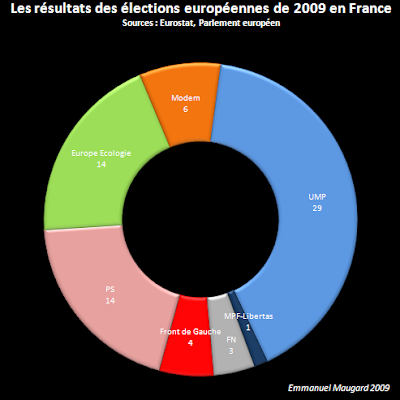
Voters and days Voting
388 million people vote, from Thursday, June 4 to Sunday, June 7, 2009, for renewal of the European Parliament. The United Kingdom and the Netherlands voted on Thursday, Ireland and the Czech Republic on Friday, Italy, Latvia, Malta and Slovakia on Saturday. All other countries including France voted Sunday. For France, Saint Pierre and Miquelon, St. Barthelemy, St. Martin, Guadeloupe, Martinique, French Guiana, French Polynesia voted Saturday. Polls are open from 8 am to 18 pm In some cities the office closes at 19 pm 20 hours to see the most important as Nantes. Citizens of another State of the Union residing in France are entitled to vote in France.
functions MEPs
MEPs in number from 736 to 27 countries are elected by universal suffrage. This election in 1979. They are elected for five years. They serve one week per month, in plenary session in Strasbourg. Otherwise, they work in commissions and hearings in Brussels.
MEPs approve the appointment of the Commission President and Commissioners responsible for the administration of the European Union. They can overturn the commission by a majority of 2 / 3. The Committee is appointed by heads of state.
They vote or reject the Council of the EU budget prepared by the commission. This budget is a hundred billion. They can change for certain expenses. Their main task is to enact laws, shared responsibility with the Council of the European Union. They vote and make the laws in codecision with the Council of Ministers in the 2 / 3 of domains (eg environment, transport, internal market, services, free movement ...). They may reject or modify the legal texts prepared by the Commission. They are consulted on matters of taxation, industrial policy and agriculture. Some decisions must be approved by the Parliament as the EU enlargement.
MEPs are paid a salary of € 5,963 net. It adds a monthly allowance of € 4,202, and daily from 298 €.
This is a list system to a single round of proportional representation. The ballots include a list of names equal to twice the number of seats in the constituency. It should block any names, otherwise the ballot is void. The seats are allocated by proportional representation, following the rule of highest average, between the lists receiving more than 5% of the percentages expressed. See example below.
A parity is not respected
The gender balance is not met. During the term, 2004-2009, 245 of the 785 MEPs are women. Only Estonia and Luxembourg have as many women than men members. France ranks fifth for parity with 35 deputies elected for 78.
Composition of Parliament 2004-2009


Two major political groups are needed in the European Parliament: on the left, the Socialist Group (PES), right EPP-ED (Democrats Christians). MEPs are divided into seven political groups. The number of MEPs vary by population state. The more a country's population, it has more members. Germany has in the current parliament seats 99, France 78, Malta 5. This distribution is not just the weight of population states. Smaller states are better represented.
parties contesting the elections of 2009
In France, more than 36 political parties and groups arise. Only the major parties have lists in all constituencies as the UMP and the PS.
A rate Forbearance too high
In France, the European elections mobilize soon. In 2004, the abstention rate was the strongest of all the Fifth Republic for a national election out referendum. In 2009, it was even higher! E. Maugard



0 comments:
Post a Comment